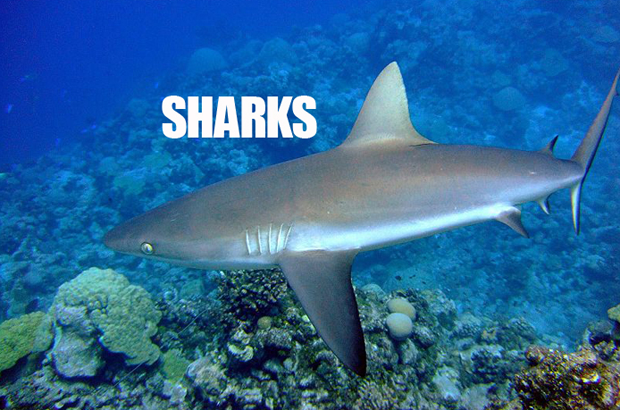Shark conservation, science, and management
[dropcap]N[/dropcap]ot only are sharks among the ocean’s top predators and vital to the natural balance of marine ecosystems, they are also a valuable recreational species and food source. To help protect these important marine species, the United States has some of the strongest shark management measures worldwide. NOAA Fisheries works with U.S. regional fishery management councils, commercial and recreational fishermen, academics, environmentalists, and others to conserve and sustainably manage domestic shark fisheries in both the Atlantic Ocean, including the Gulf of Mexico and Caribbean Sea, and the Pacific Ocean.

Gray reef sharks appear grayish-brown with white undersides and a black margin on their tail fin. They have a broadly-rounded snout and very large eyes. Gray reef sharks school during the day, but are more active nocturnally. Credit: Pacific Islands Fisheries Science Center.
U.S. Leads the way
By conducting research, assessing stocks, working with U.S. fishermen, and implementing restrictions when necessary, we sustainably manage shark populations. For overfished shark stocks, we apply management measures to rebuild the stock to a healthy level. Sustainably managed shark fisheries provide opportunities for both commercial and recreational fishermen.
NOAA Fisheries also works with international organizations to get global shark conservation and management measures adopted. In addition to prohibiting shark finning in the United States, we continue to promote a fins naturally-attached policy globally.
U.S. Laws and International Agreements for Shark Conservation
The Shark Conservation Act of 2010 amended the Magnuson-Stevens Fishery Conservation and Management Act, which is the federal law governing the conservation and management of federal fisheries. Along with the suite of conservation and management measures this act requires of all federal fisheries, including shark fisheries, the new additions from the Shark Conservation Act makes the United States a leader in the sustainable management of domestic shark fisheries and the global conservation of sharks.
2013 was marked by a historic conservation milestone for sharks globally. At the 2013 Convention on International Trade in Endangered Species of Wild Fauna and Flora (CITES) meeting in Bangkok, countries agreed to increase protection for five commercially-exploited species of sharks: oceanic whitetip shark; scalloped, smooth, and great hammerhead sharks; and the porbeagle shark. NOAA Fisheries played a key role in the development and adoption of these proposals. The new requirements will go into effect on September 14, 2014. Read more . . .
NOAA Fisheries is also working to strengthen protections and support recovery of scalloped hammerhead shark populations. In July 2014 NOAA Fisheries announced new listings under the Endangered Species Act for certain populations of scalloped hammerhead sharks. The final rule lists four Distinct Populations Segments of scalloped hammerhead sharks under the Endangered Species Act:
- Two are listed as threatened (Central and Southwest Atlantic Distinct Populations Segment and Indo-West Pacific Distinct Populations Segment)
- Two are listed as endangered (Eastern Atlantic Distinct Populations Segment and Eastern Pacific Distinct Populations Segment) under the Endangered Species Act.
Read more about the scalloped hammerhead shark listings . . .
Science Supports Shark Conservation and Management
Globally there is a general lack of data reporting on the catch of sharks, particularly species-specific data. For these reasons, sharks present an array of issues and challenges for fisheries conservation and management both domestically and internationally. Despite the challenges, NOAA Fisheries is committed to achieving sustainable management of sharks.
NOAA Fisheries conducts scientific research around the United States to collect data to better understand sharks and their biology, populations, and movement patterns. For example, in 2014, NOAA scientists released results of a study that offers an optimistic outlook for the recovery of white sharks in the Northwest Atlantic Ocean. Internationally, we provide technical assistance to other countries in support of their shark conservation efforts, including shark identification and data collection workshops. NOAA Fisheries also collaborates on research promoting science-based management measures and conservation of sharks in our global ocean.
Globally there is a general lack of data reporting on the catch of sharks, particularly species-specific data. For these reasons, sharks present an array of issues and challenges for fisheries conservation and management both domestically and internationally. Despite the challenges, NOAA Fisheries is committed to achieving sustainable management of sharks.
About NOAA:
NOAA Fisheries conducts scientific research around the United States to collect data to better understand sharks and their biology, populations, and movement patterns. Internationally, we provide technical assistance to other countries in support of their shark conservation efforts, including shark identification and data collection workshops. NOAA Fisheries also collaborates on research promoting science-based management measures and conservation of sharks in our global ocean.
Click here to go to NOAA Shark Week Site . . .
View slideshow Gray reef sharks appear grayish-brown with white undersides and a black margin on their tail fin. They have a broadly-rounded snout and very large eyes. Gray reef sharks school during the day, but are more active nocturnally. Credit: Pacific Islands Fisheries Science Center – click here to view slideshow . . . http://www.fisheries.noaa.gov/stories/2013/08/08_2_13shark_science_research_policy.html


